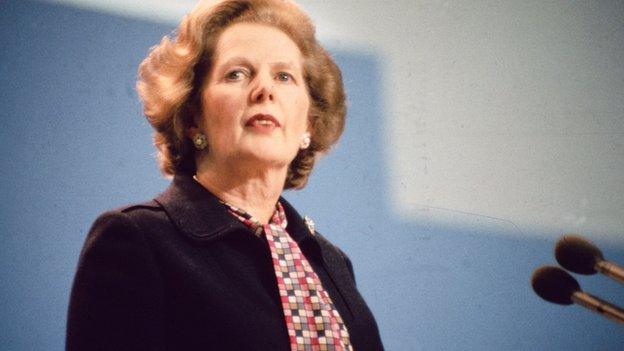Margaret Thatcher - The quintessentially English PM
- Published

She never quite got Scotland. However, Margaret Thatcher is not alone among Westminster leaders in that regard.
For the most part, she was adored by her party in Scotland, just as in England. But, even as they worshipped, quite a few Scottish Tories fretted that her politics would prove particularly divisive north of the border and thus electorally unpopular.
In many ways, she typified the conundrum which confronted the Conservative Party and continues to do so to this day. Her instincts, their instincts, were for a powerful brand of economic liberalism applied uniformly and with vigour across the United Kingdom.
By contrast, the Scots were demonstrating their appetite for tailored politics, for distinctive treatment. For self-government, in short.
Collective attitude
Margaret Thatcher was proudly, quintessentially English at a time when the Scots were rediscovering and reasserting their sense of Scottish identity. Further, there is more of a collective attitude in Scotland, some of it authentic, some of it contrived.
To be clear, that potential misalliance is by no means unique to Margaret Thatcher, nor indeed to the Conservative Party. But perhaps it reached its apex with her.
To repeat, she sometimes struggled to comprehend, intuitively and instinctively, why a political recipe which brought her adoration or, at least, admiration from wide sectors of the populace in England failed to produce the same results in Scotland, to the same degree.
She would talk of Adam Smith, of the Scots' belief in self-help which, she asserted, was in line with her thinking. This was not a sound bite, not a contrived pitch. She was genuinely puzzled that Thatcherism did not find more fertile ground north of the border.
Myths have arisen. That the poll tax was tried out in Scotland as some form of gruesome experiment. In truth, the Scottish Tories and their ministers in the Scottish Office were agitating for change as a consequence of vigorous anger at a rates revaluation which had sent bills soaring.
Secondly, many believe that the Tory collapse in Scotland began and ended with Baroness Thatcher. In truth, the Tories had entered a pattern of decline from a high point in the 1950s, with sporadic mini-revivals - although successive peaks mostly tended to be lower than the last. Their Westminster wipe-out only occurred in 1997, long after Margaret Thatcher left office.
Still, authentic memories persist too. Mining and steel communities, to be blunt, will neither forgive nor forget, however often they are chided to reflect upon the leadership of their own cause or the underlying nature of past, industrialised Scotland.
Those who regarded the poll tax as an evil abomination will, equally, neither forgive nor forget. They will regard issues such as the conundrum of cross-border politics as mere sophistry, compared with those perceived certainties.
But, for the most part, political leaders in Scotland as elsewhere will today pay tributes to one of Britain's longest serving and most forceful Prime Ministers.